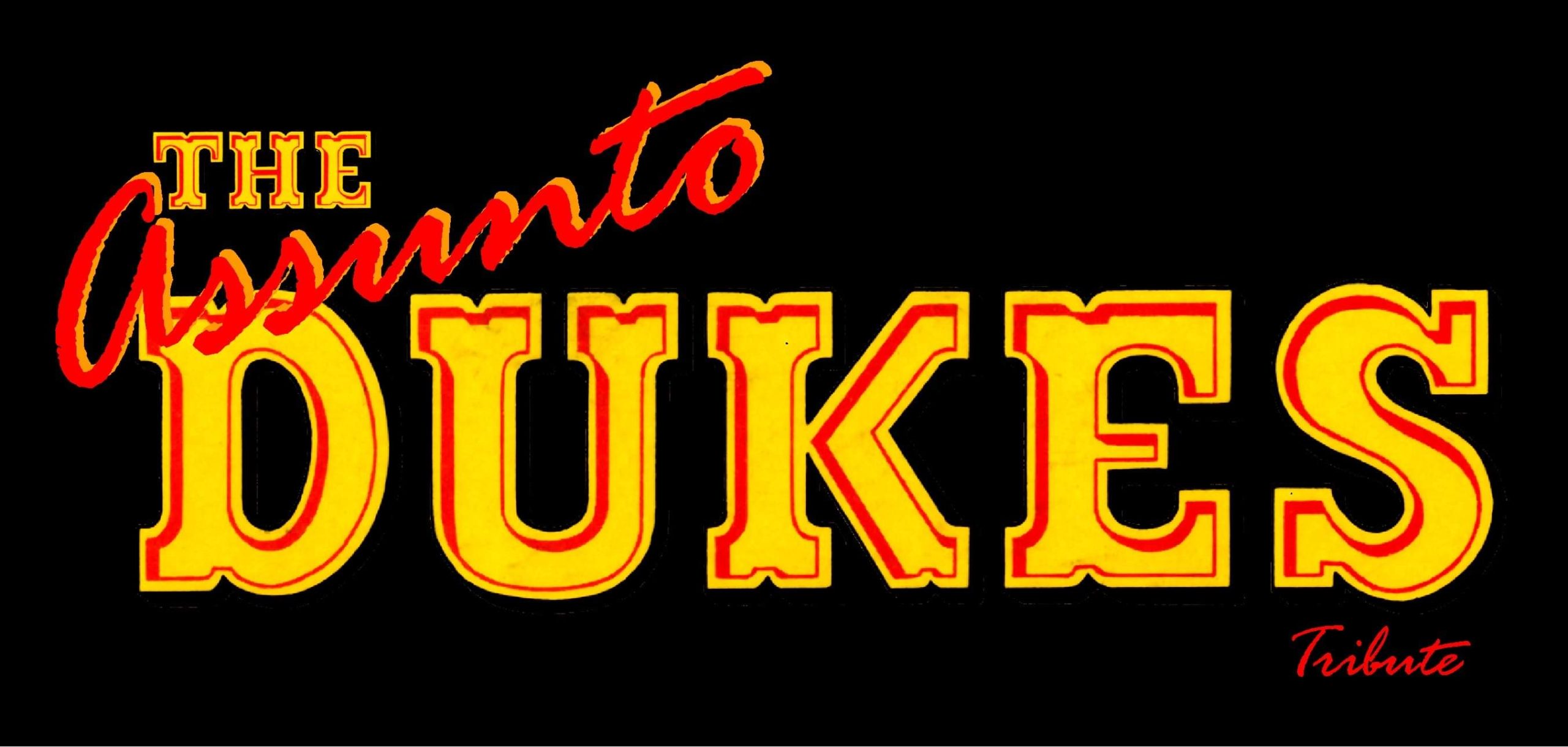 In 1946 a 14 year old Frank Assunto along with his 17 year old brother Fred began playing on Saturday’s at Mama Lou’s Seafood restaurant and sometimes across the river at the Moonlight Inn along with other youngsters on Saturday nights. Frank Assunto recalled those days at Mama Lou’s saying they were paid $3 each a night but since none of them were old enough to drive a car the cab fare to and from took most of their money. But they got what was in the “kitty” (a tip jar) and sessions lasted from 10pm until 2am with one break at midnight when the budding young musicians could go into the kitchen and eat all the seafood they could hold. Broke, but well fed was Frank’s summation of those early days. A young Pete Fountain was often a member of this band.
In 1946 a 14 year old Frank Assunto along with his 17 year old brother Fred began playing on Saturday’s at Mama Lou’s Seafood restaurant and sometimes across the river at the Moonlight Inn along with other youngsters on Saturday nights. Frank Assunto recalled those days at Mama Lou’s saying they were paid $3 each a night but since none of them were old enough to drive a car the cab fare to and from took most of their money. But they got what was in the “kitty” (a tip jar) and sessions lasted from 10pm until 2am with one break at midnight when the budding young musicians could go into the kitchen and eat all the seafood they could hold. Broke, but well fed was Frank’s summation of those early days. A young Pete Fountain was often a member of this band.
By 1947 the band was reorganized as the Basin Street Four, Five or Six depending on how many members could be rounded up. They played for the sheer pleasure after high school and where ever else they could. The weekend gigs continued at the seafood place.
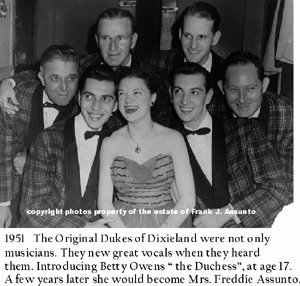 The Assunto brothers played in the Redemptorist High School‘s marching band and it was during a performance by the school band that a young Freddie Assunto caught the eye of a 14-year old Betty Owens who thought he was one of the most handsome things she had ever seen. Betty and a friend tagged along with the parade and followed them back to the school. Eventually they arrived at the Assunto house where Betty saw Freddie coming out the back door and knew she was at the right place. She was introduced to Fred by a friend who was dating Frank Assunto at that time. One thing led to another and soon the Assunto family had gained a new member and the band had gained a singer, The Duchess of Dixieland, as Betty became known when she sang with the band. Betty had been a hillbilly singer on the local scene since around age 6. She was too young to go in some of the bars and clubs with the band at first but was soon singing along with them.
The Assunto brothers played in the Redemptorist High School‘s marching band and it was during a performance by the school band that a young Freddie Assunto caught the eye of a 14-year old Betty Owens who thought he was one of the most handsome things she had ever seen. Betty and a friend tagged along with the parade and followed them back to the school. Eventually they arrived at the Assunto house where Betty saw Freddie coming out the back door and knew she was at the right place. She was introduced to Fred by a friend who was dating Frank Assunto at that time. One thing led to another and soon the Assunto family had gained a new member and the band had gained a singer, The Duchess of Dixieland, as Betty became known when she sang with the band. Betty had been a hillbilly singer on the local scene since around age 6. She was too young to go in some of the bars and clubs with the band at first but was soon singing along with them.
After hearing that the weekly Horace Heidt Pot O’Gold radio show was coming to New Orleans on a combined playing engagement and talent hunt, the Assunto brothers rounded up a 7-piece band and practiced furiously for the show. Players for the Heidt contest were Frank Assunto on trumpet, Fred Assunto on trombone, Pete Fountain on clarinet, Tommy Balderas on guitar, Willie Perkins on drums, Artie Seelig on Piano, and Hank Bartels on bass. They called themselves the Junior Dixieland Band for the show and on February 20, 1949 won top honors in the local talent contest and an invitation to tour with the Heidt show. They were runner up in the national talent contest in Cincinnati to a pair of girl singers. After six weeks with the Heidt Show the brothers decided to turn professional. They left the Show with about $500 and hotfooted it back to New Orleans. They got uniforms and joined the musicians union. Success was not instantaneous and at first the best they could do was a monthly guest appearance at the meetings of the New Orleans Jazz Club.
They were featured in the New Orleans Jazz Festival held by the club at the city Auditorium in 1949. Their first regular job was a 22 week stay at the Golden Slipper in Baton Rouge, Louisiana . Members of the band at this time were Artie Seelig, Piano; Chink Martin, Jr. on string bass; Bill Shea (an outlander from Highland Park, IL) on clarinet and Willie Perkins on drums in addition to the two Assunto brothers.
Many Dixieland groups over the years have had KING in the name and this had something to do with them selecting THE DUKES OF DIXIELAND as the name for their new band in 1949.
The band had played at Tony Almerico’s Parisian Room and some other clubs as the Junior Dixie Band. Sharkey Bonano & his Kings of Dixieland were just ending a long engagement at the Famous Door in 1950 where they were the house band in preparation to going on the road.
Sharkey Bonano was an idol to the Assunto brothers and while discussing a more adult name for the band they felt they wanted to honor Sharkey as the “king” but not compete with him by having KING in the name of their band.
One night at a family discussion of this Mama Josie, as Papa Jac’s wife Josephine Assunto was affectionately called, suggested that they call themselves the Dukes of Dixieland to continue the tradition of royalty and yet leaving Sharkey Bonano as the KING of Dixieland.
Thus Was Born the Name The DUKES OF DIXIELAND . . .
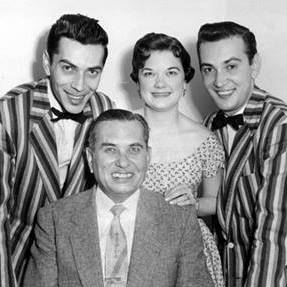 In December 1950 drummer Willie Perkins had left the band to join the Army and was replaced by Von Gammon. With this group on 12/18/50 they opened at the Famous Door on Bourbon Street as the Dukes of Dixieland and soon became the “house” band staying an outstanding 3-1/2 years. All the while the Famous Door had taken a chance on engaging the relatively unknown Dukes of Dixieland for an initially short term; they proved so popular that they stayed there for an outstanding 176 weeks. It was certainly the reverse after the end of their 44 month stay and the Dukes were well known in traditional circles. Sometime in 1951 they made their first recording; it was a commercial for the Louisiana Gas and Light Company, called “Cooking with Gas”. And, knowing the Dukes it probably was a gas.
In December 1950 drummer Willie Perkins had left the band to join the Army and was replaced by Von Gammon. With this group on 12/18/50 they opened at the Famous Door on Bourbon Street as the Dukes of Dixieland and soon became the “house” band staying an outstanding 3-1/2 years. All the while the Famous Door had taken a chance on engaging the relatively unknown Dukes of Dixieland for an initially short term; they proved so popular that they stayed there for an outstanding 176 weeks. It was certainly the reverse after the end of their 44 month stay and the Dukes were well known in traditional circles. Sometime in 1951 they made their first recording; it was a commercial for the Louisiana Gas and Light Company, called “Cooking with Gas”. And, knowing the Dukes it probably was a gas.
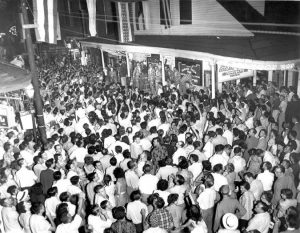
They performed at Summer Pop concert at Beauregard Square in 1951 and the concert was broadcast by local station WNOE. Station DJ Roger Wolfe owned the New Orleans Bandwagon label and he put out the early sides by the Dukes. The Dukes were on the way up the ladder of success; they made their first recordings in 1951 for local labels Bandwagon and Imperial. The Dukes were well known after their stay at the Famous Door and soon they were playing at top spots around the country. As well as playing the trumpet, brother Frank also sang vocals for the group. It wasn’t long until Betty Owen, wife of Fred Assunto in private life, was also singing with the band as the “Duchess of Dixieland”.
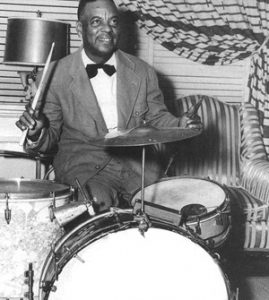
Veteran New Orleans drummer Paul Barbarin who wrote Bourbon Street Parade was a friend of the band and they featured his song at the Door. The tune 339 Rag was written at this time as the Famous Door was at 339 Bourbon Street. The Dukes also recorded some sides for local Imperial label including being the first to record Bourbon Street Parade in 1951. Personnel stayed about the same during the stay except for clarinet. Tony Parenti played for 7 weeks with the band while visiting New Orleans. And for a time Harry Shields (brother of Larry Shields of the Original Dixieland Jass Band fame) held down the clarinet chair.
Around late 1951-1952 a young law student at Tulane University named Joe Delaney became the groups manager and he, too, was a big help to the group’s success. Just like New York’s 52nd Avenue, Bourbon Street gradually turned into a strip dancer’s lane and one night a stripper named Jewel Brynner (stage named after Yul) appeared on the Famous Doors stage with a head as bare as the rest of her.
The Dukes decided to move on to better things up north. And following a jazz tradition they went to Chicago. They were a hit at the Preview Lounge on Randolph Street.
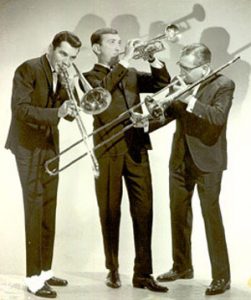 In 1955 Betty Owens left the band to give birth to her and Fred’s first child and the two Assunto brother’s dad, Jacinto Assunto, took a leave from his teaching job to fill in for Betty with the band. Papa Jac as he was known played both trombone and banjo as a featured soloist with the Dukes. The three Assuntos, Frank, Fred, and Papa Jac, would form the core of the Dukes of Dixieland for years to come.
In 1955 Betty Owens left the band to give birth to her and Fred’s first child and the two Assunto brother’s dad, Jacinto Assunto, took a leave from his teaching job to fill in for Betty with the band. Papa Jac as he was known played both trombone and banjo as a featured soloist with the Dukes. The three Assuntos, Frank, Fred, and Papa Jac, would form the core of the Dukes of Dixieland for years to come.
Betty did sing with the band later on though as more kids came along her singing career dwindled away as her chores as a mother increased. This is a shame as she was one of those singers who deserved more exposure and she left only a handful of recorded songs as a legacy. Anyone who has heard Betty sing a rousing vocal to “Jazz Me Blues”, or “After You’ve Gone”, only wants to hear more. My own New Orleans jazz collection contains 80+ versions of Jazz Me Blues and the Betty Owens vocal is the only vocal I have; and one of two that I know of. Frank, Fred and Papa Jac would form the core of the Dukes of Dixieland for years to come. Papa Jac often hides the fact that he has a degree in Business Administration from Tulane University and, indeed, he was the Dukes manager, handling some business chores for them.
Sometime in 1955 the Dukes first played in Las Vegas; they and the town hit it off and in 1956 the Dukes moved to Las Vegas spending 64 weeks at the Thunderbird in Las Vegas being held over several times by popular demand. In Vegas there was constant work including the Dunes, the Sinbad Lounge and others. Next was a 16 week stay at the Preview Lounge in Chicago (the longest for a Dixieland band there); and other top spots in Chicago were at the Blue Note and Jazz Limited.
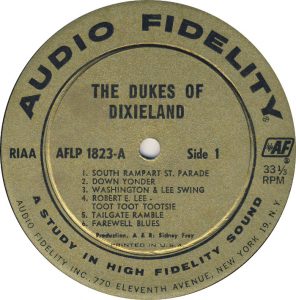 In 1956 Sidney Frey of Audio Fidelity Records was in Las Vegas looking for some unusual act he could feature on his label. Stereo records were coming and Frey was determined to beat the major labels to the market place with the first stereo records and he wanted to sign “someone” that would showcase the new style of recording. Audio Fidelity pioneered the commercial introduction of the “stereo” phonograph record utilizing the newly chosen standard, the Westrex 45/45 system.
In 1956 Sidney Frey of Audio Fidelity Records was in Las Vegas looking for some unusual act he could feature on his label. Stereo records were coming and Frey was determined to beat the major labels to the market place with the first stereo records and he wanted to sign “someone” that would showcase the new style of recording. Audio Fidelity pioneered the commercial introduction of the “stereo” phonograph record utilizing the newly chosen standard, the Westrex 45/45 system.
The story is that Frey asked a bartender if there were any unusual acts in town that he could listen to and maybe use to show off his “new” stereo records. The bartender reportedly steered Sidney to a nearby lounge/casino that had an act involving 3 pianos but when he got there the three pianos were gone and he heard the Dukes instead. He considered the wide range of instruments in the band to be a natural to show off “stereo”.
The Dukes signed an exclusive recording contract with Audio Fidelity Records in the mid-50’s which would bring the first of a long series of recording innovations by the band. The DUKES OF DIXIELAND 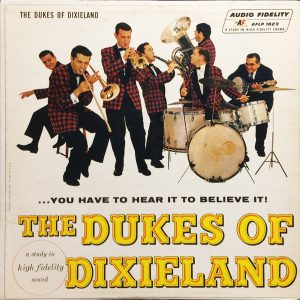 became the first jazz band to record in stereo. In anticipation of the of the coming “stereo” age some sessions were on 2 or 3 channel tape in a form that could go right to record; some sessions had to be redone for stereo.
became the first jazz band to record in stereo. In anticipation of the of the coming “stereo” age some sessions were on 2 or 3 channel tape in a form that could go right to record; some sessions had to be redone for stereo.
In January 1959 Sidney Frey was in New York to be honored by the Friars Club as Man of the Year for 1958 for his Audio Fidelity Company’s introduction of the stereo disc. The Dukes of Dixieland were on hand as part of the entertainment and a pleased Frey presented the Dukes with a check for $100,000 as an advance against future royalties on their albums. Reportedly the Dukes were so pleased that they spontaneously played “When My Sugar Walks Down the Street”. This led to the press declaring that the Dukes were a band that records built. [a truth in the 50’s and according to the GHB Jazz Foundation’s George Buck, Jr. still true in the 90’s as his popularity polls are almost always topped by the groups who record the most.]
By late 1959 the Dukes 9 albums for Audio Fidelity had sold over 1,000,000 copies and the band was getting $3,000 for a weeks engagement with no rivals close in the world of traditional jazz. And in 1959, a short 11 years after turning professional, the Dukes reached that epitome for a jazz band: a packed audience for a Carnegie Hall concert.

Part of this performance is on an LP by Audio Fidelity; they also played in the Playboy Jazz Festivals in 1959 and 1960. When the Dukes first hit the Roundtable in NYC the club had mostly had empty seats. After the word got out about the DUKES energetic performances extra tables and chairs had to be brought in and this started another ‘dixie’ revival in NY as heretofore it had been mainly dead.
Ed Sullivan caught the act one night and was so impressed by the Dukes and the closeness of the family as a part of the act that he booked them for the next Sunday night. they appeared three times that year on Ed’s national TV show which not only topped the ratings but actually affected trends in music nationally. Many other top clubs saw the Dukes in the next few years including setting a record gate at the famous ROUNDTABLE club in New York in May 1960 during a two week stay. Mama Josie remembers Red Nichols saying, “we all owe those kids a debt of gratitude. Till they hit town we were havin’ trouble getting any work at all”
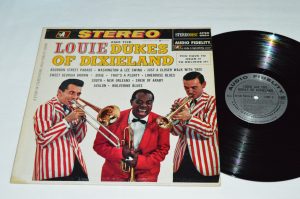 During this boom period Frey paid Louis Armstrong a whopping $40,000 for two sessions for Audio Fidelity. One with Louis and the All Stars and one of Louis and the Dukes of Dixieland. A new high was reached late that year and into early 1960 when the Dukes had three sessions with the immortal jazzman Louis Armstrong who was also an Audio Fidelity artist at that time.. Actually for convenience’s sake I’ve divided the Chicago session into two as that is the way it is referred to in other articles on this and rather than endlessly explain that there was only 1 long Chicago session (not two) it is easier to adopt the viewpoint most expressed in the past news. These sessions between hometown New Orleans jazzmen are probably the Dukes best Audio Fidelity LPs; two of the three sessions were issued as Audio Fidelity LPs (see items 25 & 49) and the third came out on CD in 1988 (see items 70,71, & 72). Some alternate takes from these sessions came out on Charoscuro Records in the 70’s.
During this boom period Frey paid Louis Armstrong a whopping $40,000 for two sessions for Audio Fidelity. One with Louis and the All Stars and one of Louis and the Dukes of Dixieland. A new high was reached late that year and into early 1960 when the Dukes had three sessions with the immortal jazzman Louis Armstrong who was also an Audio Fidelity artist at that time.. Actually for convenience’s sake I’ve divided the Chicago session into two as that is the way it is referred to in other articles on this and rather than endlessly explain that there was only 1 long Chicago session (not two) it is easier to adopt the viewpoint most expressed in the past news. These sessions between hometown New Orleans jazzmen are probably the Dukes best Audio Fidelity LPs; two of the three sessions were issued as Audio Fidelity LPs (see items 25 & 49) and the third came out on CD in 1988 (see items 70,71, & 72). Some alternate takes from these sessions came out on Charoscuro Records in the 70’s.
The extensive recording in the late 50s for Audio Fidelity made the Dukes internationally popular and known by all. While having numerous solo performances, the Dukes were basically a traditional group 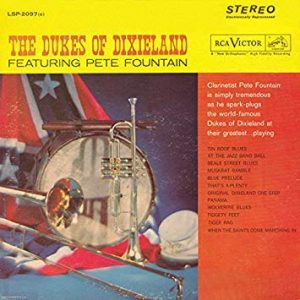 playing combo style jazz and this often resulted in personnel turnover, particularly at clarinet, by those wanting a more prominent solo style career. For instance, the early Dukes band had Pete Fountain on clarinet from the Junior Dixieland Band days. And, a good example of this band was waxed on RCA LP, LPM-2097, first issued in 1955 with some of the most driving jazz you’ve ever heard.
playing combo style jazz and this often resulted in personnel turnover, particularly at clarinet, by those wanting a more prominent solo style career. For instance, the early Dukes band had Pete Fountain on clarinet from the Junior Dixieland Band days. And, a good example of this band was waxed on RCA LP, LPM-2097, first issued in 1955 with some of the most driving jazz you’ve ever heard.
During the 50’s the Dukes were home to a virtual Who’s Who of traditional jazz musicians including on clarinet: Pete Fountain, Tony Parenti, Bill Shea, Harry Shields, Jack Maheu and Jerry Fuller. On drums you had Ray Bauduc, Paul Wettling, Buck Rogers, Buzzy Drootin, Willie Perkins, Tommy Rundell, Roger Johnson and Norman “Red” Hawley; Artie Seelig and Stanley Mendelson did duty on the piano. Along with guitarists Jim Hall and Tommy Balderas there were Bill Porter, Rich Matteson, Jim Atlass, Chink Martin, Henry Bartels and Lowell Miller on bass or tuba (or both). Saxophonist Al Belletto rounds out the crew in that first decade.
By the end of the decade of the 50’s the Dukes had toured internationally and boasted 20 TV appearances including 3 on Ed Sullivan’s show, 3 on Garry Moore’s show and 3 on the Timex Jazz Hour program (and on two of those occasions Louis Armstrong was on the same bill). These two Timex Jazz Hour shows of 4/30/58 and 01/07/59 are noteworthy as precursor to the actual performances of the Dukes with Louis Armstrong in 1959 and 1960.
THE 1960s
As the Dukes became more and more tour-oriented their repertoire gradually evolved too. From pure standards in the New Orleans tradition they were soon playing pop and show tunes and Broadway show tunes, all in Dixieland style, at requests from the audience. Many of their later LPs for Columbia and DECCA reflect this new repertoire.
In 1965 they were on the Dean Martin TV show. And Frank Assunto’s son, Deano, was named after Dean Martins son Deano as both Joan and Frank like Deano and decided if they had a boy they would name him that.
The death of Fred Assunto from cancer (heart attack) on April 21, 1966 at age 36 in Las Vegas was a blow to the band; he was replaced initially by Dave Remington followed by Ed Hubble, Charlie Bornemann and others.
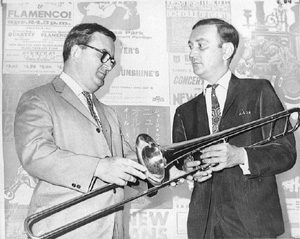 Brother Frank presented Fred’s gold and silver trombone to the New Orleans Jazz Museum in May of 1966. July, August and October 1966 found the Dukes at the Metropole in New York for a series of 10 day stays. The Dukes were touring extensively and also played the Century Plaza Hotel in Los Angeles and the Roosevelt Hotel’s Blue Room in hometown New Orleans and a 2-week whirlwind tour of one night stands at Carolina colleges. The death of brother Fred definitely blunted the momentum the Dukes had and Frank was reluctant to tour as extensively as before (which was all the time).
Brother Frank presented Fred’s gold and silver trombone to the New Orleans Jazz Museum in May of 1966. July, August and October 1966 found the Dukes at the Metropole in New York for a series of 10 day stays. The Dukes were touring extensively and also played the Century Plaza Hotel in Los Angeles and the Roosevelt Hotel’s Blue Room in hometown New Orleans and a 2-week whirlwind tour of one night stands at Carolina colleges. The death of brother Fred definitely blunted the momentum the Dukes had and Frank was reluctant to tour as extensively as before (which was all the time).
The Dukes were booked solid most of the time in the 60’s mainly in the Midwest and in June 1966 were making arrangements for a five week tour of Germany, and two weeks in Vietnam.
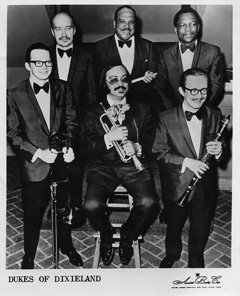 In 1967, the Dukes played at a jazz concert in Evansville, Indiana on the same stage with Stan Kenton’s Orchestra and in a pre-concert interview by Bob Byler, Frank Assunto offered the following views.
In 1967, the Dukes played at a jazz concert in Evansville, Indiana on the same stage with Stan Kenton’s Orchestra and in a pre-concert interview by Bob Byler, Frank Assunto offered the following views.
“Traditional jazz, in my estimation, can only be played by people who are old enough to have lived it. Anything else is a copy. You have a lot of young bands that should like, or try to sound like, the old timers. I don’t know; it just doesn’t come off to me,” he said.
“Then there’s what you call ‘Dixieland’. I’ve never liked that word in a musical connotation. It’s a geographical connotation. You see, we’re the Dukes from Dixieland, not the Dukes of Dixieland jazz.” “That type of jazz can be played by anybody, because it’s more free-wheeling, has more solos, the mix of two-beat and four-beat, and it has more space for freedom of personal expression. Where do we fit in that picture? Well, we’re not really a traditional band by any means. We’re what I call a New Orleans-oriented jazz band, That’s all.” He added, “I tell a new guy in the band, ‘Look, man, I hired you to play your horn. You figure out what the heck to play on there. You know, this is a jazz band; it’s not a prison. So have a ball. Play good, that’s all’. If you don’t have fun, the audience is the first to know it. And if you don’t have fun, how can you play.”
Frank was concerned about survival of the music, but optimistic. He cited various “revivals”, the Bob Crosby’s Bobcats in 1938 and Sharkey Bonano, Turk Murphy and Lu Watters in the late 40’s. He said the Dukes were in on a revival of the late 1950s and added,
“I hope I’m there” for the next revival. His outlook was contemporary and he deplored the public’s limited musical imagination and fascination with the “Golden Dozen” well-known tunes. “Either you are a fan of the music and the sound, or you’re a fan of the titles. If you’re going to look for song titles, go play a jukebox”, he said. “Jazz is current; it’s 1967, not 1927. We’ve got to start thinking about jazz today, not as though it were 10 years ago or even two years ago. Think about today – the sounds and the pulse and the beat of today’s life.”
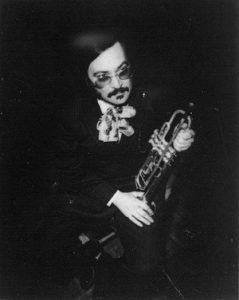 Brother Frank was wanting to come back to his beloved New Orleans as a home base. Without Fred the life in Las Vegas had paled. The houses in Vegas were sold and the family moved back to Louisiana.
Brother Frank was wanting to come back to his beloved New Orleans as a home base. Without Fred the life in Las Vegas had paled. The houses in Vegas were sold and the family moved back to Louisiana.
By August 1969 the whole Assunto clan was back in Louisiana; all near each other in an apartment complex in Metairie, LA as they had been close to each in physical location before they left. In 1969 the Dukes opened at Economy Hall at the Royal Sonesta Hotel actually before the Hotel itself opened. Later a rift with Hotel management caused Frank to move the Duke’s home base to the club of Al Hirt when the band was not on tour. Frank Assunto was laying plans for his lifelong dream of his own club in New Orleans and was nearly ready when he died of a coronary on the eve of Mardi Gras, February 1974 at the age of 42. His dream for his own club was to have been finalized the next week.
Louis Cottrell’s ONWARD BRASS BAND played for Frank’s jazz funeral; the first by that traditional brass band for a white musician in it’s 90 year history. Papa Jac Had ceased playing with the band when Frank died in 1974 and he passed away in 1985 at age 79 leaving the “Duchess” as the last surviving member of the Dukes of Dixieland.
And on Tuesday, December 26, 2006 Betty “the Duchess” Assunto passed away ending the reign of The Dukes of Dixieland. Their legacy will live on through recordings, videos, and accomplishments which can NEVER be duplicated.
